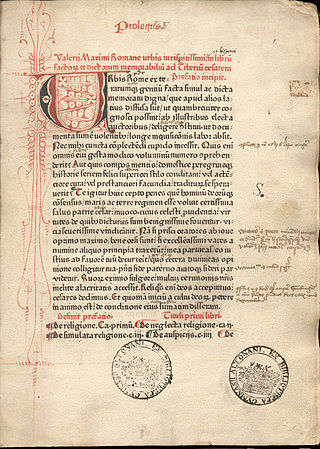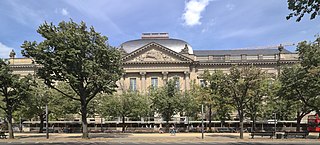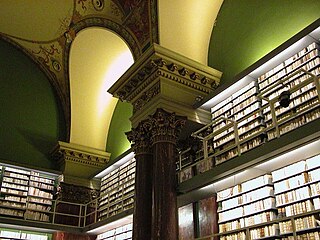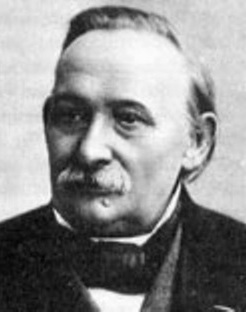| Collection of German Prints | |
|---|---|
| Location | Germany |
| Type | Virtual library |
| Scope | Entire German-language literature |
| Established | 1989 |
| Branches | 6 |
The Collection of German Prints (German : Sammlung Deutscher Drucke) or SDD is the virtual German national library. Founded in 1989 by an association of six German libraries it covers the entire German-language literature.
Each library is responsible for a specified period of time:

An incunable or incunabulum is a book, pamphlet, or broadside that was printed in the earliest stages of printing in Europe, up to the year 1500. Incunabula were produced before the printing press became widespread on the continent and are distinct from manuscripts, which are documents written by hand. Some authorities on the history of printing include block books from the same time period as incunabula, whereas others limit the term to works printed using movable type.

Leopold Zunz was the founder of academic Judaic Studies, the critical investigation of Jewish literature, hymnology and ritual. Zunz's historical investigations and contemporary writings had an important influence on contemporary Judaism.

Christian Gottlob Heyne was a German classical scholar and archaeologist as well as long-time director of the Göttingen State and University Library. He was a member of the Göttingen school of history.

The Philipps University of Marburg is a public research university located in Marburg, Germany. It was founded in 1527 by Philip I, Landgrave of Hesse, which makes it one of Germany's oldest universities and the oldest still operating Protestant university in the world. It is now a public university of the state of Hesse, without religious affiliation.

The Berlin State Library is a universal library in Berlin, Germany and a property of the Prussian Cultural Heritage Foundation.

The German National Library is the central archival library and national bibliographic centre for the Federal Republic of Germany. It is one of the largest libraries in the world. Its task is to collect, permanently archive, comprehensively document and record bibliographically all German and German-language publications since 1913, foreign publications about Germany, translations of German works, and the works of German-speaking emigrants published abroad between 1933 and 1945, and to make them available to the public. The DNB is also responsible for the Deutsche Nationalbibliografie and several special collections like the Deutsches Exilarchiv 1933–1945, Anne-Frank-Shoah-Bibliothek and the Deutsches Buch- und Schriftmuseum. The German National Library maintains co-operative external relations on a national and international level. For example, it is the leading partner in developing and maintaining bibliographic rules and standards in Germany and plays a significant role in the development of international library standards. The cooperation with publishers has been regulated by law since 1935 for the Deutsche Bücherei Leipzig and since 1969 for the Deutsche Bibliothek Frankfurt am Main.
A universal library is a library with universal collections. This may be expressed in terms of it containing all existing information, useful information, all books, all works or even all possible works. This ideal, although unrealizable, has influenced and continues to influence librarians and others and be a goal which is aspired to. Universal libraries are often assumed to have a complete set of useful features.
The Verzeichnis der im deutschen Sprachraum erschienenen Drucke des 17. Jahrhunderts, abbreviated VD17, is a project to make a retrospective German national bibliography for the 17th century. The project was initiated in 1996 and planned to continue for 10–12 years. It is financed by the Deutsche Forschungsgemeinschaft. As of early 2007, the database contains more than 250,000 titles.

The Herzog August Library, in Wolfenbüttel, Lower Saxony, known also as Bibliotheca Augusta, is a library of international importance for its collection from the Middle Ages and early modern Europe. The library is overseen by the Lower Saxony Ministry for Science and Culture.

The National Library of Latvia is a national cultural institution under the supervision of the Ministry of Culture of Latvia. Its current main building is known as the Castle of Light. The National Library of Latvia was formed in 1919 after the independent Republic of Latvia was proclaimed in 1918. The first supervisor of the Library was Jānis Misiņš, a librarian and the founder of the Latvian scientific bibliography (1862–1945). The current building was designed in 1989 by noted Latvian-American architect Gunnar Birkerts (1925–2017), who immigrated to the United States and made his career there. It was constructed in the early 21st century and opened in 2014. Today, the Library plays an important role in the development of Latvia's information society, providing Internet access to residents and supporting research and lifelong education.
The Verzeichnis der im deutschen Sprachbereich erschienenen Drucke des 16. Jahrhunderts , abbreviated VD 16, is a project to make a retrospective German national bibliography for the sixteenth century. The project was compiled during the period 1969–1999. It is financed by the Deutsche Forschungsgemeinschaft.

The Frankfurt University Library is the library for the Goethe University Frankfurt, Germany.

A scientific collection is a collection of items that are preserved, catalogued, and managed for the purpose of scientific study.
The Consortium of European Research Libraries (CERL) is a consortium of research libraries, primarily in Europe, that facilitates access to historians with an interest in the history of the book by providing online resources. The organisation also makes grants to librarians, holds seminars and workshops, and since 1998 has published a periodical called CERL Papers. It was founded in 1992 and since 2021 has been registered in the Republic of Ireland as a company limited by guarantee, based in Dublin.
Karl Günther Ernst Felix Becker was a German art historian, best known today for the project Thieme-Becker.

Franz Theodor Magnus Böhme was a German academic, musicologist, composer, folksong collector and writer on music history and folksong.
As of 2018, ten firms in Germany rank among the world's biggest publishers of books in terms of revenue: C.H. Beck, Bertelsmann, Cornelsen Verlag, Haufe-Gruppe, Holtzbrinck Publishing Group, Ernst Klett Verlag, Springer Nature, Thieme, WEKA Holding, and Westermann Druck- und Verlagsgruppe. Overall, "Germany has some 2,000 publishing houses, and more than 90,000 titles reach the public each year, a production surpassed only by the United States." Unlike many other countries, "book publishing is not centered in a single city but is concentrated fairly evenly in Berlin, Hamburg, and the regional metropolises of Cologne, Frankfurt, Stuttgart, and Munich."

A collective collection, shared collection, collaborative collection, or shared print program is a joint effort by multiple academic or research libraries to house, manage, and provide access to their collective physical collections. Most shared print programs focus on collections of monographs and/or serials. Similar efforts have addressed acquisition and/or retention of microform, federal government documents, and digital collections. Shared print programs often have activities in common with national repositories and archiving programs. Discussions surrounding shared print programs in their current form have come to the forefront as a popular solution to shrinking collection budgets, rising costs of resources, and competing space needs.
Werner Schuder was a German publisher.